Librotraficante
On the road to Arizona.
When ethnic studies programs in Tucson public high schools were eliminated earlier this year, books in the curricula, including many by notable Latino writers, were pulled from classrooms. El Librotraficante (aka, Houston-based writer Tony Diaz) and members of Nuestra Palabra, Latino Writers Having Their Say, organized the Librotraficante Caravan to take the banned books back to Tucson and into the hands of those protesting the decision.
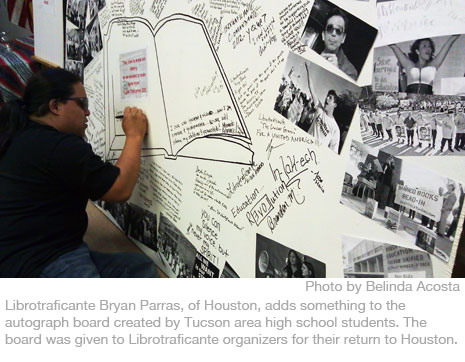
Librotraficante Caravan: Final
Librotraficante leader Tony Diaz chose droll words when he took the podium at Tucson’s John Valenzuela Youth Center on March 16.
“I’m obliged to the Tucson Unified School District for creating this little book club,” he said to the press, there to capture the arrival of the Librotraficante Caravan, as it ended its thousand-plus mile journey from Houston. As cameras rolled, 25 other Librotraficantes unpacked books that would seed the Librotraficante Underground Library at the Valenzuela Center, one of four such libraries opened along the caravan’s six-city tour that launched on March 12. The creation of the underground libraries was among the varied responses to the school district’s decision to shut down the Mexican American Studies (MAS) program and remove books used in its curriculum from Tucson public schools earlier this year. Over 1000 books were collected during the caravan, organizers say.
Minnie and Jesse Alvarez were among the dozen or so area residents who attended the Tucson press conference. Their granddaughter Juliana León is a Tucson High School senior and a vocal protester since the MAS program shut down.
“I am very happy to see this,” Minnie Alvarez said, her eyes tearing. “I feel like there’s support, that we’re not alone here in Tucson.”
The books were removed under HB 2281, the Arizona legislation that prohibits the teaching of courses in public schools that “promote the overthrow of the U.S. government, promote resentment toward a race or a class of people, are designed primarily for pupils of a particular ethnic group, or advocate ethnic solidarity instead of the treatment of pupils as individuals.” Gov. Jan Brewer signed HB 2281 into law May 2010. It went into effect in January 2011. Schools in violation of the law could lose state funding.
The response was loud when Tucson’s MAS program ended. But the strongest outcry came when books used in the MAS curriculum were boxed up earlier this year—as students watched—and removed from classrooms. The news reached Houston, where members of Nuestra Palabra, a group dedicated to promoting Latino arts and letters, felt compelled to act. Taking a Swiftian approach, Nuestra Palabra galvanized support throughout Texas and beyond to organize the Librotraficante Book Caravan to “smuggle” books back in to Arizona. State and local education officials have insisted that the books are not banned, but are merely “not approved for instruction.” The books, most of them by Latino authors, were initially removed from Tucson schools and placed in repositories; some are reportedly now available in school libraries. The debate surrounding HB 2281 continues in Arizona.
The constitutionality of the law is at the core of a lawsuit filed by students and their supporters against state education officials. Several students, their parents and about 60 onlookers attended a hearing in the case on March 19. The plaintiffs assert that the language of HB 2281 is highly interpretive and that utilizing it to shut down Tucson’s MAS program is arbitrary and discriminatory. The case is before Ninth Circuit Court Judge A. Wallace Tashima.
In the meantime, the Librotraficantes have returned home and organizers are planning phase two of the protest against the law.
“This is just the beginning,” Diaz said at the Tucson press conference. “This is a movement that’s here forever and is shaping the way America thinks. We’re ushering in the Latino Renaissance.”
Librotraficante Caravan: Day 3—El Paso to Mesilla and Albuquerque, New Mexico
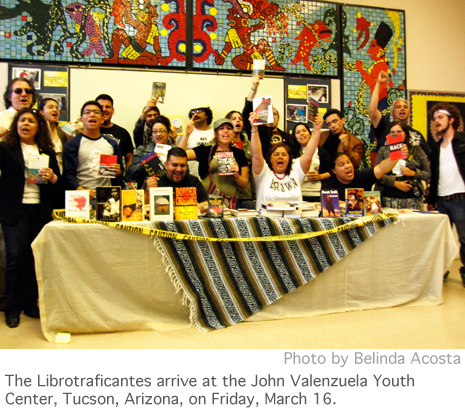
It’s really quite amazing what a couple of laptops, three cell phones, an operational hotspot and an indefatigable spirit can do. Novelist and educator Tony Diaz may be the public voice of the Librotraficantes and their three-state caravan, but he’s the first to say he’s not the only voice. The team of Diaz, Liana Lopez, Laura Acosta, Bryan Parras and Lupe Mendez—with the aforementioned electronic equipment—has managed to negotiate logistics, organize a caravan, contact like-minded organizations in each Librotraficante Caravan stop and spread the word about the mission. The organizers’ work has drawn coverage from media outlets in each caravan stop, as well as from CNN, MSNBC, Huffington Post, Al Jazeera, and the New York Times, not to mention the Texas Observer. And the list is growing.
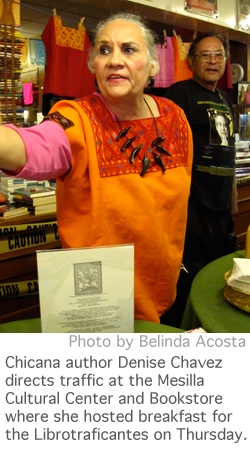 Hours before arriving in Tucson on March 16, Lopez was balancing her laptop on her knees updating a press release, as the Librotraficantes charter bus sped down Interstate 10. The spotty hotspot service, not to mention the occasional bump in the road, was making her task challenging. Yet, she remained upbeat, pausing to accommodate a caravan member who had come to the front of the bus to charge her cell phone. (With only three available power sources, those outlets never went unused.) Lopez’s cell phone didn’t stopped ringing. So Acosta stepped in to field calls, calmly explaining that Lopez “was tied up. How can I help you?”
Hours before arriving in Tucson on March 16, Lopez was balancing her laptop on her knees updating a press release, as the Librotraficantes charter bus sped down Interstate 10. The spotty hotspot service, not to mention the occasional bump in the road, was making her task challenging. Yet, she remained upbeat, pausing to accommodate a caravan member who had come to the front of the bus to charge her cell phone. (With only three available power sources, those outlets never went unused.) Lopez’s cell phone didn’t stopped ringing. So Acosta stepped in to field calls, calmly explaining that Lopez “was tied up. How can I help you?”
In the meantime, Diaz was being interviewed by phone or writing a blog post for Mamiverse about his Librotraficante Caravan experience [mamiverse.com]. After weeks of interviews leading up to the launch of the caravan and addressing audiences in Houston, San Antonio, El Paso and Mesilla and Albuquerque, New Mexico, Diaz was losing his voice, a few hundred miles from Tucson. Mendez’s job that day was to keep Diaz quiet—no small task given Diaz’s gift for speaking extemporaneously.
During the trip, Mendez, along with Parras and the rest of the Librotraficante crew, discussed logistics. But perhaps most importantly, in terms of getting their message out, they made sure the Librotraficantes who’d joined the caravan were able to speak cogently about the events that brought them together, and expressed the value of using social media, particularly Twitter.
“This is an example of new media saving old media,” Diaz said of how harnessing Twitter and Facebook was one of the many ways the Librotraficantes connected with groups along the caravan route. The result of all this earnest, behind-the-scenes work is one of the reasons the Banned Books Bash in San Antonio, El Paso and Albuquerque were hugely successful. It was standing room only at the National Hispanic Cultural Center, for the Albuquerque Book Bash on March 15. About 500 gathered to hear readings by local writers Tony Mares, Tanaya Winder, Levi Romero and others. Earlier that day, Chicana author Denise Chávez hosted a luncheon for the Librotraficantes in Mesilla. The extraordinarily charming village is home to Chávez, where she runs the Mesilla Cultural Center and Bookstore and coordinates the Border Book Festival, now in its 17th year. [borderbookfestival.org]. She donated several boxes of books for delivery to Tucson. Fifteen percent of book sales at the Albuquerque Book Bash were donated to the Librotraficante Caravan. Gifts of books and money will be used to seed the four inaugural Librotraficante Underground libraries. The libraries will initially be stocked with titles pulled from Tucson high school classrooms when a state law precipitated the shuttering of ethnic studies programs on the grounds that they promoted hatred and division. The four Librotraficante libraries are based in Houston (MECA, Multicultural Education and Counseling Through the Arts), San Antonio (Southwest Workers’ Union), Albuquerque (Los Jardines Institute) and Tucson (John Valenzuela Youth Center.)
At each Banned Book Bash, Diaz told audiences they were now deputy Librotraficantes. People took this label to heart, as books were delivered by hand, in boxes and bags, or by cash donations. This outpouring of support created another logistical problem for the team to solve. When it came time to leave Albuquerque for Tucson, Parras and Mendez, (tasked with sorting the literary cargo) worried that there was not enough room for books and caravan members’ luggage. Some creative re-packing solved the problem. Another bump in the road averted.
Librotraficante Caravan: Day 2 – San Antonio to El Paso
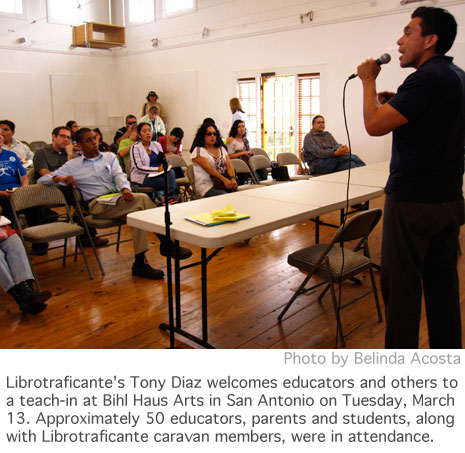
It’s a long ride from San Antonio to El Paso, and the Librotraficante Caravan members were feeling every mile of it. A successful Banned Book Bash at the Guadalupe Cultural Arts Center Tuesday topped off the second, full day of events in San Antonio, which also included a Latino Cultural Caucus and a teach-in. The former was a discussion with local area organizers about the importance of school boards and how to make them responsive to all students’ needs. (Hint: voting matters.) The latter was a workshop where Librotraficante members suggested ways to engage, challenge, and inspire students with literature and the arts. (Hint: ask students what they are interested in learning about and why.)
At the Banned Book Bash later that evening, writers from John Phillip Santos to Sharon Olinka to Lorna Dee Cervantes read selections from works by banned writers like Cesar Chavez, William Shakespeare, Cervantes, and many others. The audience of about 300 was electrified as the reading progressed, but just as often, was stung. A disbelieving gasp was a familiar exclamation, as those who came to support the Librotraficante’s mission discovered that a book, their book—the book that changed their life, freed their spirit—was among those removed from Tucson public schools.
“How could they ban Bless Me Ultima?”
“How could they ban Zoot Suit?”
“How could they ban The House on Mango Street?”
“They banned Drown, The Tempest, Zigzagger? How could they?”
How?
The “how” is now part of the public record and understood as something that needs to be corrected. It’s the “why” that was beginning to cause a great deal more consternation. (The Tucson Unified School District removed the books, citing a state law that banned ethnic studies programs on the grounds that they promote hatred and division.)
When the Librotraficante Caravan left San Antonio at daybreak for the second, and longest leg of the trip to El Paso, caravan members were understandably bleary-eyed. The first hour on the bus was silent, as the Librotraficantes napped to the persistent whir of the bus.
It was after the meal break in Ft. Stockton that caravan co-organizer Bryan Parras suggested that the group watch Precious Knowledge. The 2011 documentary outlines the events leading up to the elimination of the Ethnic Studies program in the Tucson public high schools and the response by students and educators. There were more of those familiar gasps and expressions of outrage, and maybe even a slight sense of foreboding. Just what kind of storm was this caravan driving into? When the film stopped unexpectedly, the shouts were particularly sharp. Just as anger was percolating around the series of events Precious Knowledge detailed, Parras had stopped the film so that another Librotraficante Caravan rider could speak. Lupe Mendez of Houston announced that he’d just been accepted to graduate school. Furthermore, once they learned of his participation on the Librotraficante Caravan, he was offered a scholarship. The cloud of dismay was wiped away with a hearty round of applause and cheers for Mendez’s news.
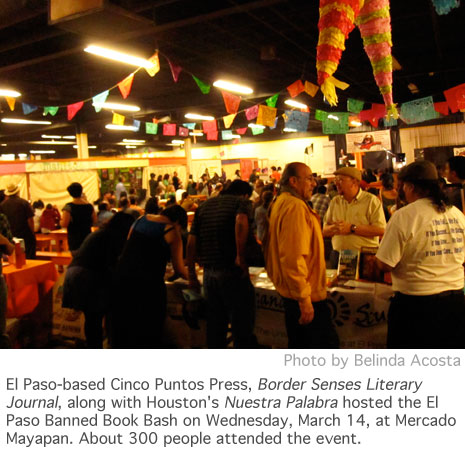
Precious Knowledge ignited a thoughtful discussion that could have gone long into the night, but there was no time. The caravan rolled into El Paso with just enough time to check in to the hotel before heading to the second Banned Book Bash at the Mercado Mayapán. The evening ended with music, a hot plate of food, readings, and more importantly, a renewed sense of purpose.
Librotraficante Caravan, Day One: Houston to San Antonio
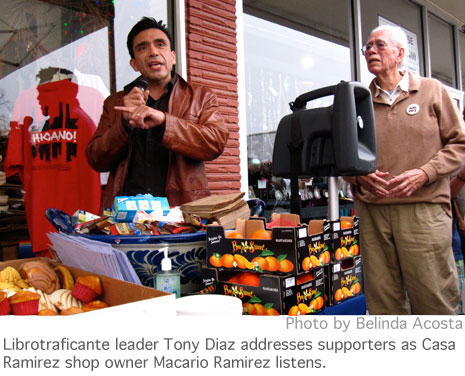
To say that Houston’s Casa Ramirez was the ideal place to kick off the Librotraficante Caravan is like saying that Santa Claus is kind of jolly. The folk art gallery, specializing in Mexican and Mexican American arts, crafts, clothing and books is much more than a storefront. It’s a gathering place for the seriously curious to learn about “folk art, cultural traditions, and good causes.” So, when organizers wondered where to launch the Librotraficante Caravan, they turned to shop owners Macario Ramirez and his wife Chrissie. They not only opened Casa Ramirez on a Monday when they’re usually closed, they provided a spread large enough to feed those assembled for the launch and morning commuters driving by.
The aroma of chocolate-flavored coffee wasn’t the only thing wafting through Casa Ramirez. There was a tangible, heartfelt excitement among the 50 or so family and friends who’d gathered to witness the Librotraficante Caravan launch with its stash of 200+ books, the majority of them eliminated from Tucson high school classrooms following the dismantling of the school’s acclaimed ethnic studies program. The caravan’s final destination is Tucson, Arizona. But first, participants will travel to points in Texas to collect additional books, more caravan riders, and celebrate the opening of the inaugural Librotraficante Underground Library.
“Take lots of pictures. This is historic,” the grandfatherly Ramirez reminded the Librotraficantes, adding that posting on Twitter would be good, too.
“When Arizona decided to erase our history, we decided to make more,” caravan organizer and lead Librotraficante Tony Diaz told the assembled.
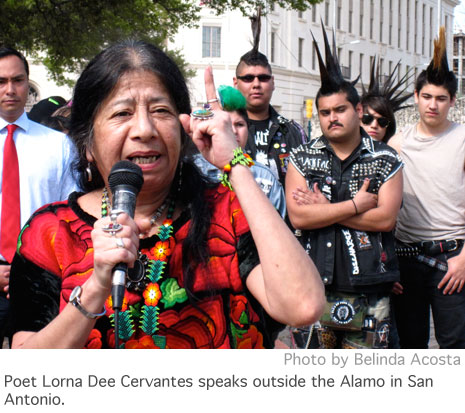
Twenty-eight Librotraficantes (including two media representatives and a film crew) boarded the Librotraficante bus. Three additional vehicles completed the caravan. Their first stop: San Antonio. There, the Librotraficantes set up a makeshift bookstand in front of the Alamo and spoke about the caravan’s mission.
Guest speakers included San Antonio-based Wings Press Publisher Bryce Milligan. He announced that Wings Press was publishing a 39th anniversary edition of poet and children’s book author Carmen Tafolla’s 1983 Curandera (among the banned books) proudly including on the cover, “Banned in Arizona.” Wings Press donated 200 copies of Curandera to the Librotraficante Caravan cargo.
Poet Lorna Dee Cervantes captivated an audience with impassioned words about the disquieting resemblance of past offenses to the present day. Although she was young, smart and ambitious, when she shared with her high school teachers that she wanted to be a writer and a scholar, she was swiftly told she would fail. Not only did she succeed, the award-winning writer became a milestone in Chicano/Latino letters in particular and American literature in general. The day’s activities ended with a celebration of the inaugural Librotraficante Underground Library at the Southwest Workers’ Union.
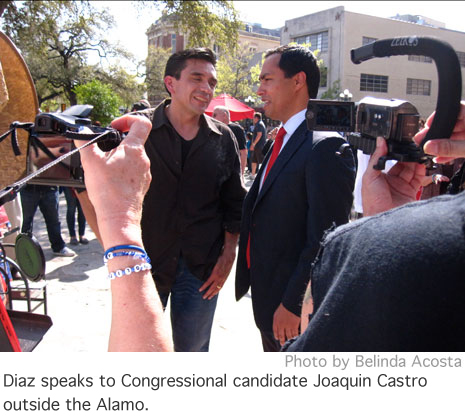
Click into the following slideshow to view images from Librotraficante’s stops on the way to Tucson.



